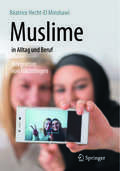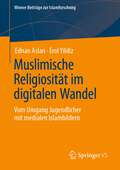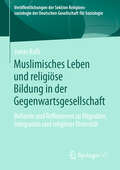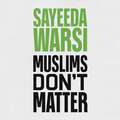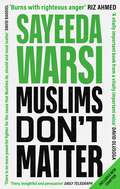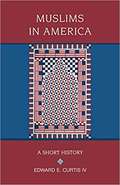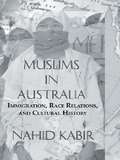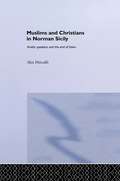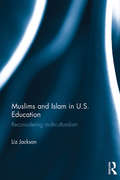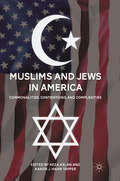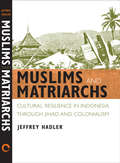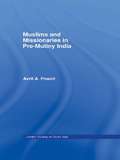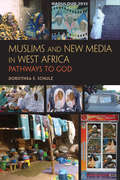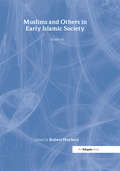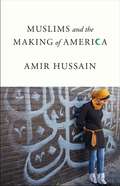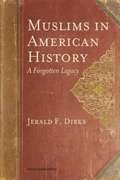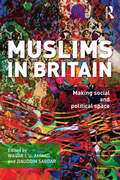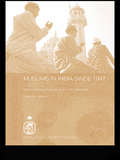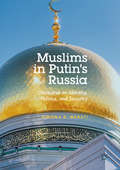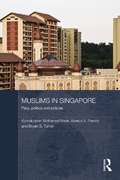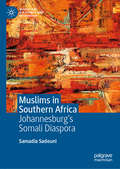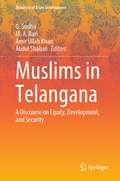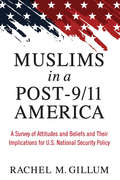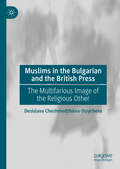- Table View
- List View
Muslime in Alltag und Beruf: Integration von Flüchtlingen
by Béatrice Hecht-El MinshawiIn diesem Buch erfahren alle, die Flüchtlingen und Asylbewerbern begegnen – privat wie beruflich –, wie sie zu einem guten Miteinander beitragen können. In Deutschland gibt es viele Neubürger und Migranten: Exilanten, Flüchtlinge und Asylbewerber. Ein Großteil kommt aus islamischen Gesellschaften und ist mit manchen anderen Normen und Werten aufgewachsen. Deshalb ist davon auszugehen, dass wir immer öfter Muslimen in Beruf und Alltag begegnen. Sie gehören zu uns. Damit das Zusammenleben und die Zusammenarbeit gelingt, ist ein fundiertes interkulturelles Wissen notwendig: kulturelle Gemeinsamkeiten und Unterschiede, Mentalitäten, Verhaltensregeln, Kommunikationsstrategien und Tabus. Dieses Praxisbuch hilft, Muslime zu verstehen und vermittelt Ideen zum gemeinsamen Handeln – mit zahlreichen Fallbeispielen und Checklisten. Es richtet sich als Beratungsbuch und Arbeitsgrundlage an alle Personen im deutschsprachigen Raum, die mit Muslimen zu tun haben, in privaten und öffentlichen Einrichtungen wie Behörden und Schulen und in Betrieben.
Muslimische Religiosität im digitalen Wandel: Vom Umgang Jugendlicher mit medialen Islambildern (Wiener Beiträge zur Islamforschung)
by Erol Yildiz Ednan AslanDie Wirkungen der sozialen Medien sind besonders in Bezug auf das religiöse Engagement und die religiösen Praktiken junger Menschen zu beobachten – die heute unter Begriffen wie „Internetgeneration“, „Mediengeneration“ oder „Digital Natives“ zusammengefasst werden. Online-Medien üben großen Einfluss auf ihr Leben, ihr Weltverständnis, ihre religiösen Orientierungen und Handlungen aus. Ihre Identitätskonstruktionen, ihre kulturellen und religiösen Orientierungen sind aufs Engste mit sozialen Medien verflochten. Genau hier setzte die vorliegende Studie mit der Frage an, welche subjektiven Konsequenzen die Interaktion im Social Web für religiöse Orientierungen, Praktiken und Selbstentwürfe muslimischer Jugendlicher in Österreich hat. Dabei standen die Zusammenhänge zwischen Mediennutzung, medialen Islambildern und gelebter Religiosität im Mittelpunkt. Die Ergebnisse zeigen einerseits, dass der Umgang mit Social Media objektive Möglichkeitsräume schafft, die mit einer Erweiterung individueller Handlungsspielräume einhergehen können, wobei religiöse Autorität zunehmend hinterfragt wird. Andererseits geht aus der Studie ebenfalls hervor, dass die Nutzung digitaler Medien auch zur Verengung individueller religiöser Orientierungen führen kann.
Muslimisches Leben und religiöse Bildung in der Gegenwartsgesellschaft: Befunde und Reflexionen zu Migration, Integration und religiöser Diversität (Veröffentlichungen der Sektion Religionssoziologie der Deutschen Gesellschaft für Soziologie)
by Jonas KolbDas Buch befasst sich mit zwei Themen, die eng miteinander verwoben sind: muslimisches Leben und islamische Bildung. Die in diesem Band versammelten Aufsätze liefern zum einen tiefgreifende religionssoziologische Einblicke in die Bandbreite und Vielschichtigkeit der muslimischen Glaubenspraxis, die unterschiedlichen Dimensionen von Religiosität im Alltag und die Ausprägungen muslimischer Lebenswelten in der deutschsprachigen Gegenwartsgesellschaft. Zum anderen werden die empirischen Analysen für Bildungskontexte, die islamische Religionspädagogik, den islamischen Religionsunterricht, die verschiedenen Lernorte islamischer Bildung, interreligiöse Lehr- und Lernkonstellationen sowie die Lehrer*innenbildung im Generellen fruchtbar gemacht. Die Aufsatzsammlung entwickelt in diesem Zusammenhang gegenwärtige bildungswissenschaftliche Ansätze zu den Themen Schule, Bildung und Pädagogik vor dem Hintergrund migrationsbedingter Prozesse weiter. Mit der systematischen Verschränkung von religionssoziologischen Befunden und bildungsbezogenen Analysen betritt das vorliegende Buch wissenschaftliches Neuland. Der Empirie, empirischen Forschungsmethoden und Erkenntnissen wird damit als wesentlichen Grundlagen theoretischer Reflexionen im Bereich der islamisch-theologischen Studien die gebührende Anerkennung verschafft.
Muslims Don't Matter
by Sayeeda Warsi'Burns with righteous anger. An urgent read for our times' Riz Ahmed'Fiery, insightful and persuasive... We cannot afford to lose Warsi. She is a vital and impassioned voice' Suzanne Moore, The Daily Telegraph'There is no more powerful fighter for the cause that Muslims do, should and must matter than Sayeeda Warsi' David Baddiel'A vitally important book from a vitally important voice'David OlusogaA DAILY TELEGRAPH MUST-READ FOR AUTUMN 2024Three grandfathers killed on the streets of England in three separate incidents by three different men. Each targeted simply for being Muslim - each attack a consequence of the insidious rise in Islamophobia in Britain.From the far-right violence that broke out in the summer of 2024 to the hatred directed at Muslims in public life during the Gaza conflict, anti-Muslim racism is dangerously out-of-control. Fed by a network of media outlets, think tanks, commentators, and even the entertainment industry, Islamophobia not only passes the dinner table test but is also Britain's bigotry blind spot. For too many, Muslims Don't Matter.In this incisive polemic, Britain's first Muslim Cabinet minister, Conservative peer, campaigner and podcaster Sayeeda Warsi uses her dual experience at the centre of British power and in the heart of our Muslim communities to unapologetically challenge the corrosive consensus. As Muslims terrified by the riots seriously consider whether Britain should still be their home, Warsi urges us to change course, to unite and dismantle this toxic bigotry.
Muslims Don't Matter
by Sayeeda Warsi'Burns with righteous anger. An urgent read for our times' Riz Ahmed'There is no more powerful fighter for the cause that Muslims do, should and must matter than Sayeeda Warsi' David Baddiel'A vitally important book from a vitally important voice'David OlusogaA DAILY TELEGRAPH MUST-READ FOR AUTUMN 2024Three grandfathers killed on the streets of England in three separate incidents by three different men. Each targeted simply for being Muslim - each attack a consequence of the insidious rise in Islamophobia in Britain.From the far-right violence that broke out in the summer of 2024 to the hatred directed at Muslims in public life during the Gaza conflict, anti-Muslim racism is dangerously out-of-control. Fed by a network of media outlets, think tanks, commentators, and even the entertainment industry, Islamophobia not only passes the dinner table test but is also Britain's bigotry blind spot. For too many, Muslims Don't Matter.In this incisive polemic, Britain's first Muslim Cabinet minister, Conservative peer, campaigner and podcaster Sayeeda Warsi uses her dual experience at the centre of British power and in the heart of our Muslim communities to unapologetically challenge the corrosive consensus. As Muslims terrified by the riots seriously consider whether Britain should still be their home, Warsi urges us to change course, to unite and dismantle this toxic bigotry.
Muslims In America: A Short History
by Edward E. Curtis IVMuslims are neither new nor foreign to the United States. They have been a vital presence in North America since the 16th century. Muslims in America unearths their history, documenting the lives of African, Middle Eastern, South Asian, European, black, white, Hispanic and other Americans who have been followers of Islam. <p><p> The book begins with the tale of Job Ben Solomon, a 18th century African American Muslim slave, and goes on to chart the stories of sodbusters in North Dakota, African American converts to Islam in the 1920s, Muslim barkeepers in Toledo, the post-1965 wave of professional immigrants from Asia and Africa, and Muslim Americans after 9/11. The book reveals the richness of Sunni, Shi'a, Sufi and other forms of Islamic theology, ethics, and rituals in the United States by illustrating the way Islamic faith has been imagined and practiced in the everyday lives of individuals. <p><p> Muslims in America recovers the place of Muslims in the larger American story, too. Showing how Muslim American men and women participated in each era of U.S. history, the book explores how they have both shaped and have been shaped by larger historical trends such as the abolition movement, Gilded Age immigration, the Great Migration of African Americans, urbanization, religious revivalism, the feminist movement, and the current war on terror. It also shows how, from the very beginning of American history, Muslim Americans have been at once a part of their local communities, their nation, and the worldwide community of Muslims. <p><p> The first single-author history of Muslims in America from colonial times to the present, this book fills a huge gap and provides invaluable background on one of the most poorly understood groups in the United States. <p><p> Religion in American Life explores the evolution, character, and dynamic of organized religion in America from 1500 to the present day. Written by distinguished historians of religion, these books weave together the varying stories that compose the religious fabric of the United States, from Puritanism to alternative religious practices. Primary source material coupled with handsome illustrations and lucid text make these books essential in any exploration of America's diverse nature. Each book includes a chronology, suggestions for further reading, and an index.
Muslims In Australia
by Nahid KabirMuslims in Australia investigates the basis of Australian society's fear of Muslims by tracing their history since the Afghan settlement in 1860. The author investigates how events such as September 11 and Bali terrorist attacks reinforce suspicion and fear, giving an insight into what it means to be a Muslim in contemporary Australia, and how the actions of militant Islamic groups have impacted upon Muslims in general in Western society.
Muslims and Christians in Norman Sicily: Arabic-Speakers and the End of Islam (Culture and Civilization in the Middle East)
by Alex Metcalfe Dr Alexander MetcalfeThe social and linguistic history of medieval Sicily is both intriguing and complex. Before the Muslim invasion of 827, the islanders spoke dialects of either Greek or Latin or both. On the arrival of the Normans around 1060 Arabic was the dominant language, but by 1250 Sicily was an almost exclusively Christian island, with Romance dialects in evidence everywhere. Of particular importance to the development of Sicily was the formative period of Norman rule (1061 1194), when most of the key transitions from an Arabic-speaking Muslim island to a 'Latin'-speaking Christian one were made. This work sets out the evidence for those changes and provides an authoritative approach that re-defines the conventional thinking on the subject.
Muslims and Islam in U.S. Education: Reconsidering multiculturalism
by Liz JacksonWinner of Philosophy of Education Society of Australasia (PESA)'s inaugural PESA Book Awards in 2015, and The University of Hong Kong Research Output Prize for Education 2014-15. Muslims and Islam in U.S. Education explores the complex interface that exists between U.S. school curriculum, teaching practice about religion in public schools, societal and teacher attitudes toward Islam and Muslims, and multiculturalism as a framework for meeting the needs of minority group students. It presents multiculturalism as a concept that needs to be rethought and reformulated in the interest of creating a more democratic, inclusive, and informed society. Islam is an under-considered religion in American education, due in part to the fact that Muslims represent a very small minority of the population today (less than 1%). However, this group faces a crucial challenge of representation in United States society as a whole, as well as in its schools. Muslims in the United States are impacted by ignorance that news and opinion polls have demonstrated is widespread among the public in the last few decades. U.S. citizens who do not have a balanced, fair and accurate view of Islam can make a variety of decisions in the voting booth, in job hiring, and within their small-scale but important personal networks and spheres of influence, that make a very negative impact on Muslims in the United States. This book presents new information that has implications for curricula, religious education, and multicultural education today, examining the unique case of Islam in U.S. education over the last 20 years. Chapters include: Perspectives on Multicultural Education 9/11, the Media, and the New Need to Know Islam and Muslims in Public Schools Blazing a Path for Intercultural Education This book is an essential resource for professors, researchers, and teachers of social studies, particularly those involved with multicultural issues, critical and sociocultural analysis of education and schools; as well as interdisciplinary scholars and students in anthropology and education.
Muslims and Jews in America
by Reza Aslan Aaron J. Hahn TapperThis book is an exploration of contemporary Jewish-Muslim relations in the United States and the distinct ways in which these two communities interact with one another in the American context. Each essay discusses a different episode from the recent twentieth and current twenty-first century American milieu that links these two groups together.
Muslims and Matriarchs: Cultural Resilience in Indonesia through Jihad and Colonialism
by Jeffrey HadlerMuslims and Matriarchs is a history of an unusual, probably heretical, and ultimately resilient cultural system. The Minangkabau culture of West Sumatra, Indonesia, is well known as the world's largest matrilineal culture; Minangkabau people are also Muslim and famous for their piety. In this book, Jeffrey Hadler examines the changing ideas of home and family in Minangkabau from the late eighteenth century to the 1930s.Minangkabau has experienced a sustained and sometimes violent debate between Muslim reformists and preservers of indigenous culture. During a protracted and bloody civil war of the early nineteenth century, neo-Wahhabi reformists sought to replace the matriarchate with a society modeled on that of the Prophet Muhammad. In capitulating, the reformists formulated an uneasy truce that sought to find a balance between Islamic law and local custom. With the incorporation of highland West Sumatra into the Dutch empire in the aftermath of this war, the colonial state entered an ongoing conversation. These existing tensions between colonial ideas of progress, Islamic reformism, and local custom ultimately strengthened the matriarchate.The ferment generated by the trinity of oppositions created social conditions that account for the disproportionately large number of Minangkabau leaders in Indonesian politics across the twentieth century. The endurance of the matriarchate is testimony to the fortitude of local tradition, the unexpected flexibility of reformist Islam, and the ultimate weakness of colonialism. Muslims and Matriarchs is particularly timely in that it describes a society that experienced a neo-Wahhabi jihad and an extended period of Western occupation but remained intellectually and theologically flexible and diverse.
Muslims and Missionaries in Pre-Mutiny India
by Avril Ann PowellFocuses on the period leading up to the Indian Mutiny of 1857.
Muslims and New Media in West Africa
by Dorothea E. SchulzAlthough Islam is not new to West Africa, new patterns of domestic economies, the promise of political liberalization, and the proliferation of new media have led to increased scrutiny of Islam in the public sphere. Dorothea E. Schulz shows how new media have created religious communities that are far more publicly engaged than they were in the past. Muslims and New Media in West Africa expands ideas about religious life in West Africa, women's roles in religion, religion and popular culture, the meaning of religious experience in a charged environment, and how those who consume both religion and new media view their public and private selves.
Muslims and Others in Early Islamic Society (The Formation of the Classical Islamic World #18)
by Robert HoylandThe interaction between Muslims and the other religious denominations of the Middle East in the period 620-1020 is the subject of this volume. This is arguably the single most important issue in the history of the early Islamic Middle East, since the Muslims were initially a minority in the lands that they had conquered and so had to reach some modus vivendi with the various religious communities in their realm. Fifteen articles by leading scholars shed light on this process from a number of different perspectives: historical, conceptual, legal, social and theological. An introduction both gives an overview and examines possibilities for future research. The period under study is demarcated at one end by the Prophet Muhammed (d. 632) who, as the Qur’an tells us, had to deal with Jews, Christians and polytheists. At the other end lies the great legal/political thinker Manardi (d. ca. 1020), by whose time the Middle East had become substantially Islamicised.
Muslims and the Making of America
by Amir HussainHussain chronicles the history of Islam in America to underscore the valuable cultural influence of Muslims on American life. He then rivets attention on music, sports, and culture as key areas in which Muslims have shaped and transformed American identity. America, Hussain concludes, would not exist as it does today without the essential contributions made by its Muslim citizens.
Muslims in American History: A Forgotten Legacy
by Jerald DirksThe book pays homage to one such forgotten legacy--the role of Muslims in American history. By offering a review based on various scholarly sources, the book broadens the understanding of American public with regard to the substantial role played by Muslims throughout American history.
Muslims in Britain: Making Social and Political Space
by Ziauddin Sardar Waqar I. U. AhmadThe management of social, religious and ethnic diversity is a key social policy concern in Britain, and Muslims in particular have become a focus of attention in recent years. This timely and topical volume examines the position of Muslims in Britain and how they are changing and making social, political and religious space. With contributions from world renowned scholars on British Muslims and from policy makers writing on issues of concern to Muslims and others alike, the book explores how British Muslims are changing social and religious spaces such as mosques and the role of women, engaging in politics, creating media and other resources, and thus developing new perspectives on Islam and transforming Muslim society from within. Chapters cover issues of religion and politics, Britishness, governance, parallel lives, gender issues, religion in civic space, ethnicity, and inter ethnic and religious relations, as well as the role of intellectuals, chaplains and activists in reforming Islam and renovating the British political landscape. Providing a broad and comprehensive examination of the key issues surrounding Muslims in the UK, this book will be a valuable resource for students, lecturers and researchers in sociology, social policy, geography, politics, Islamic studies and other related disciplines.
Muslims in Central Asia: Expressions of Identity and Change
by Jo-Ann GrossCentral Asia is distinctive in its role as a frontier region in which a unique diversity of cultural, religious, and political traditions exist. This collection of essays by expert scholars in a range of disciplines focuses on the formation of ethnic, religious, and national identities in Muslim societies of Central Asia, thus furthering our general understanding of the history and culture of this significant region.This study includes several geopolitical regions--Chinese Central Asia, Soviet Central Asia, Afghanistan, Transoxiana and Khurasan--and covers historical periods from the fifteenth century to the present. Drawing on scholarship in anthropology, religion, history, literature, and language studies, Muslims in Central Asia argues for an interdisciplinary, inter-regional dialog in the development of new approaches to understanding the Muslim societies in Central Asia. The authors creatively examine the social construction of identities as expressed through literature, Islamic discourse, historical texts, ethnic labels, and genealogies, and explore how such identities are formed, changed, and adopted through time.Contributors. Hamid Algar, Muriel Atkin, Walter Feldman, Dru C. Gladney, Edward J. Lazzerini, Beatrice Forbes Manz, Christopher Murphy, Oliver Roy, Isenbike Togan
Muslims in India Since 1947: Islamic Perspectives on Inter-Faith Relations (Royal Asiatic Society Books)
by Yoginder SikandMuslims in India today are responding to the challenge of religious pluralism in a variety of ways. This book explores the attempts being made by scholar-activists and Muslim organisations to develop new understandings of Islam to relate to people of other faiths and to the modern nation-state, and to deal with issues such as democracy and secularism. It examines how a common predicament, characterised by a sense of siege and the perception of being an oppressed minority, is producing new expressions of Islam, some of which seek to relate to non-Muslims in terms of confrontation, and others which call for dialogue, reconciliation and inter-faith harmony.
Muslims in Putin's Russia
by Simona E. MeratiThis book offers a novel interpretation of Russian contemporary discourse on Islam and its influence on Russian state policies. It shifts the analytical perspective from the discussion about Russia's Islam as a potential security threat to a more comprehensive view of the relationships of Muslims with Russia as a state and a civilization. The work demonstrates how many Muslims increasingly express a sense of belonging to Russia and are increasingly willing to contribute to state building processes.
Muslims in Singapore: Piety, politics and policies (Routledge Contemporary Southeast Asia Series #26)
by Bryan S. Turner Kamaludeen Mohamed Nasir Alexius A. PereiraThis book examines Muslims in Singapore, analysing their habits, practices and dispositions towards everyday life, and also their role within the broader framework of the secularist Singapore state and the cultural dominance of its Chinese elite, who are predominantly Buddhist and Christian. Singapore has a highly unusual approach to issues of religious diversity and multiculturalism, adopting a policy of deliberately ‘managing religions’ - including Islam - in an attempt to achieve orderly and harmonious relations between different racial and religious groups. This has encompassed implicit and explicit policies of containment and ‘enclavement’ of Muslims, and also the more positive policy of ‘upgrading’ Muslims through paternalist strategies of education, training and improvement, including the modernisation of madrassah education in both content and orientation. This book examines how this system has operated in practice, and evaluates its successes and failures. In particular, it explores the attitudes and reactions of Muslims themselves across all spheres of everyday life, including dining and maintaining halal-vigilance; education and dress code; and practices of courtship, sex and marriage. It also considers the impact of wider international developments, including 9/11, fear of terrorism and the associated stigmatization of Muslims; and developments within Southeast Asia such as the Jemaah Islamiah terrorist attacks and the Islamization of Malaysia and Indonesia. This study has more general implications for political strategies and public policies in multicultural societies that are deeply divided along ethno-religious lines.
Muslims in Southern Africa: Johannesburg’s Somali Diaspora (Migration, Diasporas and Citizenship)
by Samadia SadouniThis book presents a socio-historical analysis of the Somali Muslim diaspora in Johannesburg and its impact on urban development in the context of Somali migrations in the Southern African Indian Ocean region from the end of the 19th Century to today. The author draws on a combination of archival and ethnographic research to examine the interlocking processes of migration, urban place-making, economic entrepreneurship and transnational mobility through the lens of religious practice and against the background of historical interactions between the Somali diaspora and the British and Ottoman Empires. Comparison with other Muslim diasporas in the region, primarily Indians, adds further depth to an investigation which will shed new light on the Somali experience of mobility and the urban development of South Africa across its colonial, apartheid and democratic periods. The politics of race, imperial and post-imperial identities, and religious community governance are shown to be key influencing factors on the Somali diaspora in Johannesburg. This sophisticated analysis will provide a valuable resource for students and scholars of urban geography, the sociology of religion, and African, race, ethnic and migration studies.
Muslims in Telangana: A Discourse on Equity, Development, and Security (Dynamics of Asian Development)
by Abdul Shaban G. Sudhir M. A. Bari Amir Ullah KhanThis book analyses the state of development of Muslims at the regional level. It explains the linkages between the findings of global, national, and state-level studies with regard to the current status of Muslims and broadens understanding of Muslims and their participation in virtually all major sectors, including the economy, housing, demography, health, migration, state policy, and affirmative action. The book presents the challenges faced by the community and reflects upon the socio-economic and educational conditions of Muslims in Telangana State. It presents a comparative analysis of mortality data, maternal health, delivery care, and child immunization, as well as reproductive health aspects and children’s nutritional status. It shares valuable insights into the impacts of emigration and internal migration on health among local Muslims and presents a detailed analysis of data from the Census of India, NSSO, and Commission of Inquiry on Socio-Economic and Educational Status of Muslims regarding the social, economic, and demographic situation of Muslims in Telangana, as well as their opportunities for development under the newly formed state government. The book would be of great interest to scholars and researchers in development economics, sociology, politics, history, cultural studies, minority studies, Islamic studies, and policy studies, as well as policymakers, civil society activists, and those working in media and journalism.
Muslims in a Post-9/11 America: A Survey of Attitudes and Beliefs and Their Implications for U.S. National Security Policy
by Rachel M GillumMuslims in a Post-9/11 America examines how public fears about Muslims in the United States compare with the reality of American Muslims’ attitudes on a range of relevant issues. While most research on Muslim Americans focuses on Arab Muslims, a quarter of the Muslim American population, Rachel Gillum includes perspectives of Muslims from various ethnic and national communities—from African Americans to those of Pakistani, Iranian, or Eastern European descent. Using interviews and one of the largest nationwide surveys of Muslim Americans to date, Gillum examines more than three generations of Muslim American immigrants to assess how segments of the Muslim American community are integrating into the U.S. social fabric, and how they respond to post-9/11 policy changes. Gillum’s findings challenge perceptions of Muslims as a homogeneous, isolated, un-American, and potentially violent segment of the U.S. population. Despite these realities, negative political rhetoric around Muslim Americans persists. The findings suggest that the policies designed to keep America safe from terrorist attacks may have eroded one of law enforcement’s greatest assets in the fight against violent extremism—a relationship of trust and goodwill between the Muslim American community and the U.S. government. Gillum argues for policies and law enforcement tactics that will bring nuanced understandings of this diverse category of Americans and build trust, rather than alienate Muslim communities.
Muslims in the Bulgarian and the British Press: The Multifarious Image of the Religious Other
by Desislava Cheshmedzhieva-StoychevaThis book compares the ways in which the national media in two different countries construct (frame) and develop the image of the religious other, in this case Muslims in all their variety. Although it introduces concepts such as race and racism, otherness, Orientalism and Islamophobia, which may be familiar to the majority of readers, in this manuscript they serve the purpose of a comparative analysis which has not been done on the subject to date. The manuscript analyzes the thematic distribution of the articles, as well as the definitions, metaphors and stereotypes used, thus presenting a complete and diverse image of Muslims along with the similarities and differences in the thinking patterns employed by Bulgarians and British on the subject and expressed in the respective mainstream media. In this respect the manuscript fills a void in the scholarly literature on the ways the media discourses in two very different countries present the image of a religious group. Here we can even talk about the existing divide between East and West and the changing perception of the religious Other fostered by the general digitalization and free flow of information. As English is an international language it undeniably makes access to information easier, however, there are not many culture specific studies presenting the current state of a problem or the analyses on that particular topic (the image of Muslims) in that international medium. Therefore, the manuscript aims at introducing English speaking scholars, students, media people, and generally everyone interested in the topic, to the Bulgarian way of seeing, depicting and talking about Muslims. As stated above, the manuscript draws parallels between the language used by the Bulgarian and the British media, thus providing a similar starting point as the majority of the potential readers are probably more familiar with the latter. In addition, scholars working extensively with other local cultures and/or media and resorting to English as a medium for the popularization of their research, can use the presented analytical frame to their specific analyses and contribute even further to the enrichment of the global data base on the topic.
